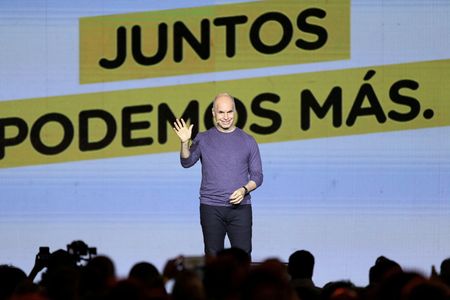 1
1 1
1
By Nicolás Misculin
BUENOS AIRES (Reuters) – Argentina’s election race is narrowing into a two-horse race, polling ahead of the Aug. 13 primary vote shows, with the ruling Peronist coalition’s choice of a centrist candidate defusing some of the threat from far-right libertarian Javier Milei.
Pollsters have the main conservative opposition bloc’s top two candidates, ex-Security Minister Patricia Bullrich and Buenos Aires Mayor Horacio Larreta, just ahead of the ruling coalition runner, Economy Minister Sergio Massa.
That has squeezed down Milei, a far-right economist who has pledged to dollarize the economy and shut the central bank, tapping into voter anger with above-100% inflation, foreign currency reserves running dry and 40% poverty.
“We’re seeing a steady, if gradual, trend towards this becoming a polarized race between the main two coalitions,” said Marina Acosta at polling firm Analogias.
The June 28-30 poll of 2,569 respondents showed 32.7% of voters support Bullrich-Larreta combined, 28.3% backing Massa, and 4% for fringe Peronist candidate Juan Grabois. Milei’s party commands 17.8%, and 12.7% are still unsure.
“The portion of people undecided has reduced and the space occupied by the ultra-right has shrunk,” Acosta said.
Argentina’s hard-hit markets and investors have cheered the candidacy of Massa, a moderate pragmatist within the Peronist bloc, which pushed aside the coalition’s more leftist faction.
Massa though faces an uphill battle against the conservatives in the October ballot, which will go to a run-off if no single candidate gets over 50%. The opposition bloc will choose between Bullrich and Larreta in the August primary.
An Electoral Observatory poll showed Bullrich with 26% support, ahead of Larreta at 14%, with Massa at 23% and Grabois at 5%, giving the opposition a 12-point lead. Milei has 15% in that poll.
CB Consultancy shows Bullrich and Larreta neck-and-neck at 17.3% and 16.5% respectively. Massa had 24.1% and Grabois 5%, meaning a slimmer 5-point lead for the opposition.
Electoral Observatory Director Julio Burdman said Larreta could also gain ground on Bullrich in the weeks ahead.
“I see some signs to make me believe that Horacio is going to level things out a little more,” he added.
Argentina’s pollsters were badly burned four years ago when they failed to predict a landslide Peronist win in the open primaries, which act as a dry run for the general election, a result that sparked a local market crash.
The pollsters said it was still hard to predict where voters would shift as candidates drop off after the primaries or in an eventual run-off.
(Reporting by Nicolas Misculin; Editing by Adam Jourdan and Richard Chang)